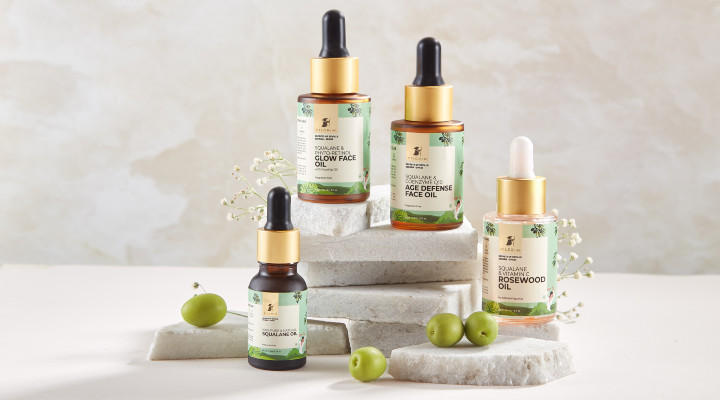Founded in 2019, Pilgrim is a direct-to-consumer (D2C) beauty and personal care brand in India that combines native beauty traditions from around the world with the wanderlust spirit of a modern millennial. Hence, the name: Pilgrim. The brand is devoted to “clean beauty” and strictly against animal testing. Its products are 100 per cent vegan, PETA certified, FDA approved, dermatologically tested and free from parabens, sulphates and mineral oils, ingredients that are commonly found in
in mainstream beauty products, and which some studies have shown to be harmful to humans’ health.
Pilgrim also aims to be a “plastic positive” brand and is trying to offset as much of its carbon footprint as possible. But none of this has slowed its rapid growth since launching just three years ago.
“2022 has been a good year for us on multiple fronts, and we have grown five to six times in our revenue numbers, with around US$1.2 million sales per month,” Anurag Kedia, co-founder and CEO of Pilgrim, told Inside Retail.
The brand has several exciting projects in the works, including the launch of its latest “Tea Tree” range for acne and blemish-prone skin, the development of a mobile-friendly app and a possible expansion into the Middle East and select Western markets.
It recently raised close to US$2 million in a Series A funding round and is plotting an international push in 2023.
Ramping up sales
Pilgrim’s commitment to making “green and clean” products isn’t the only thing that sets it apart from most other beauty brands in India. From the beginning, it has focused on adapting innovative international ingredients for the local population, giving it a unique footing in the market.
“Our first collection was based on Korean beauty. We then launched a French collection, a Spanish collection, and now the Australian collection. Every collection utilises unique ingredients from each region, and that is part of our broader appeal,” Kedia noted.
For example, the Korean collection has formulations from the pristine island of Jeju, while the French one is focused on anti-aging properties, while the Spanish collection focuses on hydration and the Australian one focuses on skin care for acne and blemish prone skin.
At the same time, Pilgrim listens closely to what the local market wants. Many product suggestions have come from customers.
“These days with social media, we can have a continuous dialogue with our consumers. We run polls all the time, consumers can reach out to us through WhatsApp or email on issues pertaining to price points, packaging and new ingredients,” he said.
In fact, the brand’s semi-global, semi-local approach was specifically designed to appeal to younger consumers and their sense of adventure and discovery.
“They genuinely want to experience different cultures, different value systems and are very inclusive in their approach,” Kedia said about Gen Z and millennials. “As a brand, Pilgrim is trying to bridge the gap and bring a level of authenticity to its products for this target market.”
Looking to expand
At the moment, Pilgrim is only available in India, but Kedia plans to branch out internationally, perhaps as early as next year.
“Around 65 per cent of our sales come from beyond the metropolitan areas, so we really go deep across the country. The other 35 per cent comes from the top ten towns in the country and we deliver to more than 20,000 pin [postal index number] codes,” he noted.
Kedia sees a lot of aspiration and affluence on display in Tier 1 and Tier 2 markets outside of India’s top ten metropolitan areas, such as New Delhi, Mumbai, and Bangalore, and the brand is focusing its efforts on getting into these markets, too.
“At the moment, we are a purely digital brand, we retail through our website and other important channel partners like Amazon, Nykaa, Flipkart and Myntra. But of course, offline is an important part of the market, so there are plans for an offline presence in 2023,” he said.
Once the brand gets the commercial aspects of the offline model right, Kedia said that Pilgrim will place an equal emphasis on physical stores in the future.
Economic headwinds
Pilgrim’s operations in India have not been insulated from all the economic turbulence that is roiling global markets right now. Supply chain bottlenecks and inflationary pressures have all had an impact on the brand’s operations in India.
“In the last eight to nine months, we have seen supply chain disruptions and inflation. Almost every single ingredient which we use in our formulations has had at least one price hike, and it’s difficult to pass this burden to the consumers, so we absorb it,” Kedia said.
In addition, packaging materials have sometimes taken up to 90 days to arrive, so the brand has had to work with suppliers to source buffer stock.
“On the demand side, we are not seeing a slowdown yet. I think consumer demand continues to remain pretty strong, and we are also very fortunate that our offerings are unique in the marketplace. Other brands do not do what we do,” he noted.
A holistic vision
Pilgrim is all about celebrating consumers and not talking down to them in any way. Kedia feels that traditional skin care companies have always preyed on consumers’ insecurities to peddle their products, and he is totally against it.
“You’re already perfect as a user. We don’t need to change you. We don’t need to tell you that there is anything lacking in you. So this is our centrepiece around dealing with conscious consumers, which is very unique in the market,” he said.
In his opinion, India is seeing a massive disruption at the dressing table, where consumers are now spoilt for choice in the beauty and personal care department.
“We have over 70 products now that take care of a whole host of skin care and personal care requirements, and this is going to keep increasing as we want to be present wherever the customer needs us to be at,” he said.

